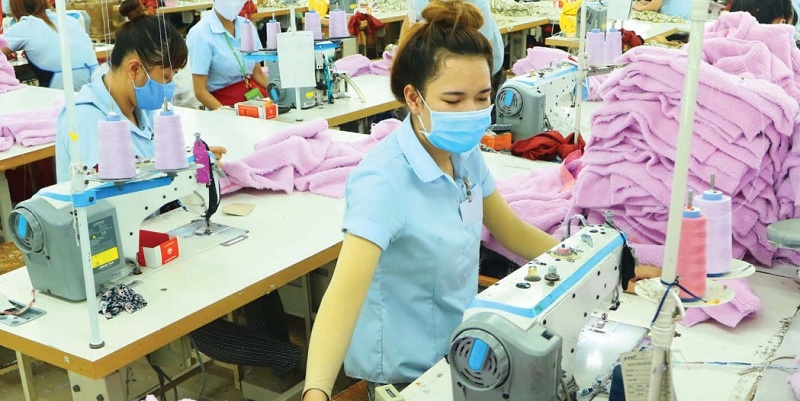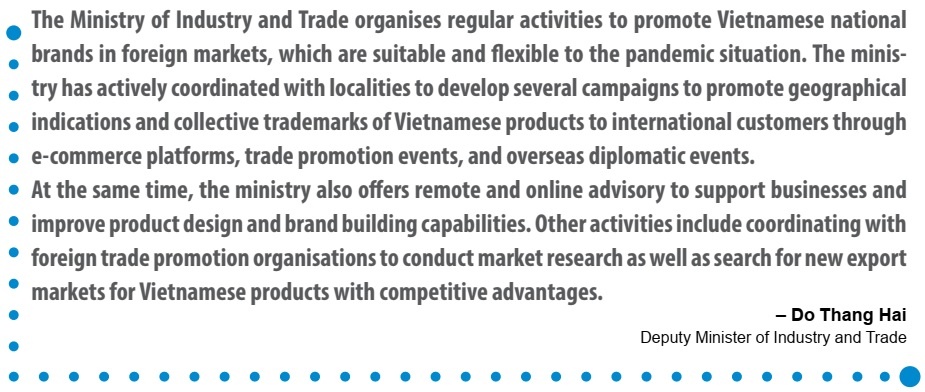Unravelling the conundrum of the Great British market
 |
| Unravelling the conundrum of the Great British market |
Vietnam has been emerging as a new manufacturing hub in Southeast Asia and the market with the world’s fastest-growing national brand, according to the Nation Brands 2020 report from Brand Finance. This is even more meaningful after the UK-Vietnam Free Trade Agreement (UKVFTA) took effect from January 1.
The prices of Vietnam’s agricultural products have become more competitive in the UK as more than 94 per cent of the total 547 tax lines for fruits and vegetables had been set to zero.
Vietnamese branded goods continue to benefit from the UKVFTA. Previously, it was difficult for Vietnamese fruits to enter the UK to compete with those from Indonesia, China, and Malaysia. Subject to the same tax rates, Vietnamese fruits had higher selling prices than their counterparts, making it difficult to attract consumers.
According to the Ministry of Industry and Trade, the export of agricultural and processed food accounts for about 10 per cent of the total value of Vietnam’s exports to the UK, equivalent to nearly $3 billion per year. This group of products boasts ample growth potential. Therefore, Vietnam can double its export value by 2025 if Vietnamese enterprises can exploit their advantages, increase investment in deep processing, and promote their brands in overseas markets.
To avail of the opportunities from FTAs, Vietnamese businesses can take advantage of rules of origin to jointly implement projects, exploit their networks, and develop logistics and e-commerce cooperation mechanisms for the processed food sector to penetrate the EU and UK markets.
 |
Not all brands succeed
The UKVFTA also provides the textile and garment sector with a solid commercial foundation based on mutual support. Vietnam’s textile and garment can diversify its raw material sources by importing from Japan and South Korea and then exporting to the UK to enjoy preferential tariff duties.
Very few ASEAN countries have similar advantages. However, the UK sets high technical standards and quality requirements for goods imported to its market. Nevertheless, the trade deal is a great opportunity for businesses with national brands to promote exports to the UK, such as Hoa Tho Textile and Garment JSC, Garment 10 JSC, and Viet Tien Garment JSC.
Vietnamese brands have already successfully penetrated the UK market. Bui Duc Tue, representative of Swiss-based One IBC Vietnam Group, said that the market share of Vietnamese-branded rice in the UK was only 0.43 per cent in 2019 and 0.45 per cent in 2020. The main reason is that Vietnamese exporters are often willing to allow distributors to use their own brands instead of Vietnamese ones.
One IBC Vietnam Group is providing trademark registration services in the UK. The company found that many businesses tried to bring Vietnamese brands to the UK market but found this difficult. Meanwhile, it is crucial for Vietnamese businesses to formulate a highly practical strategy to build their brands and gain stronger foothold in the UK.
The UK maintains a free trade policy to promote economic development, and has a large demand for agricultural products but remains very competitive for importers.
“Vietnamese products are still quite new to many Brits,” said John Gavin, director of the Southeast Asia Trade Support Organization, at a trade conference held in September.
Thus, Vietnamese brands can only enjoy benefits from the UKVFTA if they know how to take advantage of market opportunities with branded and quality products that meet the requirements of British consumers. “Vietnamese businesses have a lot to do to sell goods in the UK, including formulating a suitable branding strategy, establishing long-term customer relationships and building trust,” said Gavin.
Increasing awareness
Last year, Vietnam had 124 enterprises with 283 recognised-national branded products thanks to the Vietnam Value Programme. These businesses have gained a competitive edge when approaching overseas markets and, with a strong foundation product quality, they can learn faster.
One crucial element is that national brands cannot approach overseas markets without professional websites in English. Besides this, another effective method for businesses to approach customers is to display sample products at international trade fairs.
Currently, major UK supermarkets and retail groups tend to order directly from reputable manufacturers to diversify products as well as keep track of product origin and quality. Businesses with branded products can register to become suppliers to major UK supermarket chains through the instructions on their websites.
The UK market has a huge consumption demand. However, the export turnover of Vietnamese goods to the UK remains modest.
According to Nguyen Canh Cuong, trade counsellor at the Vietnamese Embassy to the UK, Vietnamese manufacturers should team up with local distributors to develop their own brands suitable for each market segment. These brands can also contact supermarkets or retail stores directly to bring their products into the UK.
If Vietnamese brands have yet to be recognised in the UK, it could be difficult to penetrate the market this way, and they may want to use local agents and distributors to gain access to the UK market, which could be an exporter or a factory to present their products or services to potential UK customers.
Another important thing, according to Cuong, is that Vietnamese businesses need to ensure that their distributors are knowledgeable about their products, marketing capabilities, financial potential, and reputation. They should always fulfil commitments to ensure the success of penetrating the UK market.
What the stars mean:
★ Poor ★ ★ Promising ★★★ Good ★★★★ Very good ★★★★★ Exceptional
Themes: COP26 - Together for Our Planet
Related Contents
Latest News
More News
- Vietnamese lychees debut at leading US retail giant Costco (July 23, 2025 | 15:48)
- Hanoi farms over 100 pomelo producing areas (December 05, 2024 | 18:05)
- Vietnam ranks among top three global shrimp exporters (August 07, 2024 | 16:13)
- Unlocking the potential of Vietnamese medicinal herbs (October 05, 2023 | 11:29)
- Hanoi promotes trade, investment, tourism cooperation with central provinces (July 10, 2023 | 09:57)
- VICO Fresh coconut creates buzz at trade show (May 26, 2023 | 20:20)
- Vietnam strengthens green branding (April 20, 2023 | 17:18)
- Increasing trade connectivity between Hanoi and localities (November 24, 2022 | 18:00)
- Vietnam recognises 325 products as national brands (October 26, 2022 | 17:13)
- Brand Finance Forum 2022: Honouring Vietnam’s 50 most valuable brands in 2022 (September 22, 2022 | 09:32)

 Tag:
Tag:




















 Mobile Version
Mobile Version